About
Synopsis
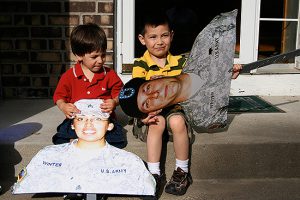 During the conflicts in Iraq and Afghanistan, only 1% of Americans served in the U.S. Military, and their families bore the disproportionate burden of 20 years at war. Many turned to “Flat Daddies” and "Heroes on a Stick," life-sized cardboard cutouts of their husbands, wives, parents and children serving overseas, to ease the pain of repeated deployments. Using these two-dimensional surrogates as a connecting thread, Flat Daddy follows four such families over the course of a year to explore the lasting impact of the war on those left behind.
During the conflicts in Iraq and Afghanistan, only 1% of Americans served in the U.S. Military, and their families bore the disproportionate burden of 20 years at war. Many turned to “Flat Daddies” and "Heroes on a Stick," life-sized cardboard cutouts of their husbands, wives, parents and children serving overseas, to ease the pain of repeated deployments. Using these two-dimensional surrogates as a connecting thread, Flat Daddy follows four such families over the course of a year to explore the lasting impact of the war on those left behind.
In Woodbury, Minnesota, Donna Winter and her husband Lowell assume custody of their two- and three-year-old grandsons when their son and daughter-in-law deploy to Iraq. Devin and Dylan initially cry themselves to sleep at night, and Donna is forced to transition from the role of doting grandmother to that of full-time working mom. As the boys gradually adjust to a home very different from the one they left behind in Texas, Do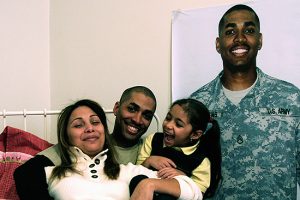 nna worries about how they will cope when their parents return for an 18-day leave, only to depart again.
nna worries about how they will cope when their parents return for an 18-day leave, only to depart again.
Jelissa Román-Stephens of The Bronx used to depend on her husband for everything, but she is surprised at how quickly she becomes self-reliant when left to manage on her own with their four-year-old daughter, Sabrina. When William comes home on leave, his natural tendency to take charge disrupts the new life his wife and daughter have built in his absence. Can their marriage adapt to Jelissa's newfound independence and a surprise extension of Papo's deployment?
Fifteen months after her son, Nacho, was killed in action, Marina Vance of Henderson, Nevada orders a Hero on a Stick in his image. She is determined to honor Nacho by marching with it in the Las Vegas Veterans Day Parade, even though she still often finds herself overcome with grief. Will she eventually be able to move on for the sake of her six surviving children?
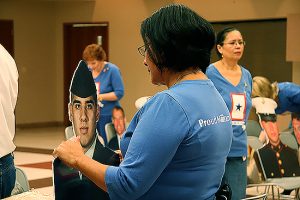 Andrea Bugbee of remote Caribou, Maine relies on two Flat Daddies to keep four-year-old Jorja and three-year-old Josiah company while she juggles multiple jobs and the responsibilities of two parents. She is overjoyed when her husband, Andrew, returns from Iraq, but real-life Daddy has difficulty reconnecting with his wife and kids. Andrea hopes the family will find its balance again, but she also knows that by the time they do, Andrew will almost certainly be preparing to redeploy.
Andrea Bugbee of remote Caribou, Maine relies on two Flat Daddies to keep four-year-old Jorja and three-year-old Josiah company while she juggles multiple jobs and the responsibilities of two parents. She is overjoyed when her husband, Andrew, returns from Iraq, but real-life Daddy has difficulty reconnecting with his wife and kids. Andrea hopes the family will find its balance again, but she also knows that by the time they do, Andrew will almost certainly be preparing to redeploy.
Employing probing interviews, intimate verité moments, vibrant images of the American landscape and personal photographs taken by the families themselves, Flat Daddy presents four unique perspectives on the war effort and the varied repercussions of deployment; together, they weave a nuanced narrative of the challenges military families face in post-9/11 America.
Directors' Statement
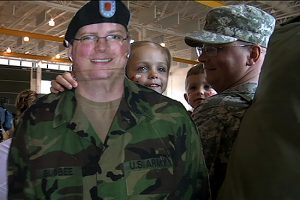 On September 30, 2006, The New York Times ran a front page article inspired by the Maine National Guard’s statewide Flat Daddy program, complete with a color photo above the fold. In the picture, a young boy plays on a swing set alongside a life-sized cardboard cutout of his deployed father. The image was absurd and haunting at the same time.
On September 30, 2006, The New York Times ran a front page article inspired by the Maine National Guard’s statewide Flat Daddy program, complete with a color photo above the fold. In the picture, a young boy plays on a swing set alongside a life-sized cardboard cutout of his deployed father. The image was absurd and haunting at the same time.
Cut to almost a year later: Betsy and Nara are introduced at a birthday party by a mutual friend. Betsy is a well-rounded filmmaker who primarily records sound for a living. Nara is a director and producer who earns a paycheck as a director of photography. Betsy proposes combining our complementary skills to collaborate on a film about Flat Daddies, and Nara, recalling the Times photograph worth the proverbial thousand words, doesn’t hesitate. A week later, piling into Betsy’s ’96 Camry with a trunk full of gear and a radiator that, unbeknownst to us, is preparing to self-destruct in Connecticut, we set off for Maine.
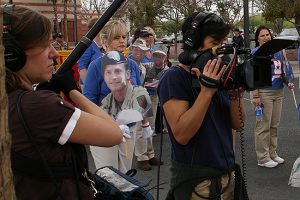 During that five-day trip, we discovered that not only did we have enough in common to keep the conversation flowing across four state lines, but we also shared a passionate desire to learn more about the increasingly fragmented country in which we live. Like many Americans, neither one of us had been directly affected by the conflicts in Iraq and Afghanistan or even knew a member of the Armed Services. It was therefore with both excitement and trepidation that we arrived for our first interview at Maine National Guard headquarters in Augusta. Sergeant First Class Barbara Claudel, Director of the Family Program, answered our many questions but finally said, “Don’t ask me; ask the families.” And that is what we have done.
During that five-day trip, we discovered that not only did we have enough in common to keep the conversation flowing across four state lines, but we also shared a passionate desire to learn more about the increasingly fragmented country in which we live. Like many Americans, neither one of us had been directly affected by the conflicts in Iraq and Afghanistan or even knew a member of the Armed Services. It was therefore with both excitement and trepidation that we arrived for our first interview at Maine National Guard headquarters in Augusta. Sergeant First Class Barbara Claudel, Director of the Family Program, answered our many questions but finally said, “Don’t ask me; ask the families.” And that is what we have done.
Since we began this film, we have met military families across the country who are for the war and against the war, those who feel that their patriotism requires them to be apolitical and those for whom it compels them to speak their minds; families who have lost loved ones, who are struggling to maintain a household and raise children with one suddenly single parent, who refuse to watch the news for fear of what they might see. The bravery and resolve of these flesh-and-blood individuals quickly put the cardboard cutouts in their place. By the time we completed our first trip, Flat Daddies were no longer the central focus of our film but symbols of the painful void at the heart of each family with a loved one serving overseas.
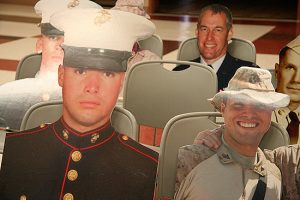 We feel privileged to have gotten to know these families, whose stories are far from over. The official end of the wars in Iraq and Afghanistan has placed new demands on families with veterans who must reintegrate into civilian life during tough economic times; other families will confront separation once again -- some for the eighth or ninth time -- as troops return to ongoing operations in Afghanistan and Iraq. If Flat Daddy brings these stories to a wider audience, fostering dialogue that transcends partisanship and new ideas on how best to support military families, we will consider our road trip a success.
We feel privileged to have gotten to know these families, whose stories are far from over. The official end of the wars in Iraq and Afghanistan has placed new demands on families with veterans who must reintegrate into civilian life during tough economic times; other families will confront separation once again -- some for the eighth or ninth time -- as troops return to ongoing operations in Afghanistan and Iraq. If Flat Daddy brings these stories to a wider audience, fostering dialogue that transcends partisanship and new ideas on how best to support military families, we will consider our road trip a success.
Production Notes
Flat Daddy completed principal photography in October, 2008 and post-production in the fall of 2011. The film had its World Premiere at the DOC NYC Film Festival on November 6th, 2011. Flat Daddy is made possible in part with public funds from the New York State Council on the Arts, a state agency. The film was fiscally sponsored by Women Make Movies and sponsored for NYSCA by the Brooklyn Arts Council.
About the Filmmakers
Nara Garber
Co-Director, Producer, Director of Photography
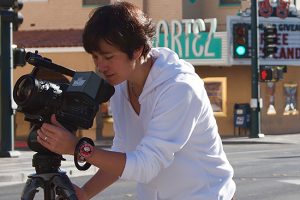 Nara is a documentary filmmaker who divides her time between directing, shooting, and editing, often wearing several hats on the same project. She currently directs and produces short-form documentaries for Carnegie Hall and has directed projects for Sotheby’s, Citigroup, Altria, The Point Foundation and the political satirists, Billionaires for Bush. Nara’s work as a DP has appeared on HBO (Making the Crooked Straight) and PBS (NOW with Bill Moyers), and her Best Cinematography award in the 2008 Asian American Film Lab’s 72 Hour Film Shootout is a testament to her ability to frame a shot with no sleep. In 2009, Nara toured military bases in Iraq while filming Susan Cohn Rockefeller’s Striking a Chord, and she heard first-hand from many of the men and women serving there that deployment is hardest on the families back home. Nara holds a BA from Harvard and an MFA from Columbia.
Nara is a documentary filmmaker who divides her time between directing, shooting, and editing, often wearing several hats on the same project. She currently directs and produces short-form documentaries for Carnegie Hall and has directed projects for Sotheby’s, Citigroup, Altria, The Point Foundation and the political satirists, Billionaires for Bush. Nara’s work as a DP has appeared on HBO (Making the Crooked Straight) and PBS (NOW with Bill Moyers), and her Best Cinematography award in the 2008 Asian American Film Lab’s 72 Hour Film Shootout is a testament to her ability to frame a shot with no sleep. In 2009, Nara toured military bases in Iraq while filming Susan Cohn Rockefeller’s Striking a Chord, and she heard first-hand from many of the men and women serving there that deployment is hardest on the families back home. Nara holds a BA from Harvard and an MFA from Columbia.
Betsy Nagler
Co-Director, Producer, Editor
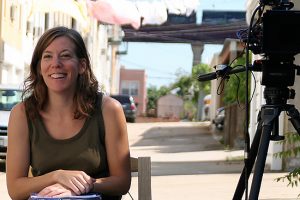 Betsy is a Brooklyn-based writer and filmmaker. Her producing, directing and editing credits include short videos for Swing Left, the New York Women's Foundation, the Dodo, the Muscular Dystrophy Association, the Working Families Party, and Carnegie Hall, video letters for the television show Blue's Clues, and episodes for the Mobilize Podcast. Her first film, 'do, was a documentary on how people feel about their hair that received completion funding from the New York State Council on the Arts via the Brooklyn Arts Council Community Arts Regrant Program. Betsy earned her BA at Stanford and her MFA at NYU. She has also taught sound recording and documentary filmmaking at NYU and Brooklyn College, and has worked as a location sound person on dozens of movies and television shows, including The Daytrippers, The Good Wife, The Sopranos, and Elementary. In 2014, she founded the creative studio Rustle Works with her husband Damon Holzborn. More info about her work can be found at betsynagler.com.
Betsy is a Brooklyn-based writer and filmmaker. Her producing, directing and editing credits include short videos for Swing Left, the New York Women's Foundation, the Dodo, the Muscular Dystrophy Association, the Working Families Party, and Carnegie Hall, video letters for the television show Blue's Clues, and episodes for the Mobilize Podcast. Her first film, 'do, was a documentary on how people feel about their hair that received completion funding from the New York State Council on the Arts via the Brooklyn Arts Council Community Arts Regrant Program. Betsy earned her BA at Stanford and her MFA at NYU. She has also taught sound recording and documentary filmmaking at NYU and Brooklyn College, and has worked as a location sound person on dozens of movies and television shows, including The Daytrippers, The Good Wife, The Sopranos, and Elementary. In 2014, she founded the creative studio Rustle Works with her husband Damon Holzborn. More info about her work can be found at betsynagler.com.
Peggy Sutton
Producer
 For her first film, Peggy directed and produced the non-fiction feature, SQUONKumentary. Selected for the 2005 NY IFP Market, SQUONKumentary also screened at the Three Rivers Film Festival, Rehoboth Beach International Film Festival and the 2006 Bend Film Festival. Over the past 25 years, her work as a script supervisor has ranged from big budgets like Men in Black II (2nd unit) to indies such as Pollock to TV shows on NBC, HBO and PBS. Peggy received her BS in Writing for TV, Radio and Film from the S.I. Newhouse School of Public Communications at Syracuse University.
For her first film, Peggy directed and produced the non-fiction feature, SQUONKumentary. Selected for the 2005 NY IFP Market, SQUONKumentary also screened at the Three Rivers Film Festival, Rehoboth Beach International Film Festival and the 2006 Bend Film Festival. Over the past 25 years, her work as a script supervisor has ranged from big budgets like Men in Black II (2nd unit) to indies such as Pollock to TV shows on NBC, HBO and PBS. Peggy received her BS in Writing for TV, Radio and Film from the S.I. Newhouse School of Public Communications at Syracuse University.
Selina Lewis Davidson
Executive Producer
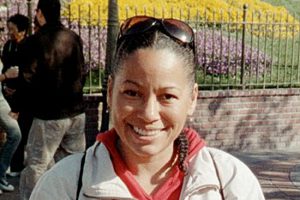 Selina has produced more than 13 nationally broadcast independent documentaries. These include: Hard Road Home, (dir: Macky Alston, PBS' Independent Lens, 2008); Occupation: Dreamland, a verité portrait of American infantrymen serving in Fallujah, Iraq (dirs: Garrett Scott & Ian Olds; theatrical release, 2005; 2006 Independent Spirit "Truer than Fiction" Award; Sundance Channel, 2006); George Ratliff's critically acclaimed Hell House (theatrical release 2002; Sundance Channel, 2003); Questioning Faith (dir: Macky Alston; Cinemax/Reel Life), Escuela (dir: Hannah Weyer; PBS/POV); Boomtown (dir: Bryan Gunnar Cole; PBS/POV) and Family Name (dir: Macky Alston; Freedom of Expression Award, 1997 Sundance Film Festival; broadcast on POV & nominated for an Emmy for Outstanding Historical Programming). Selina is also Co-Founder of GreenHouse Pictures with producer Nancy Roth.
Selina has produced more than 13 nationally broadcast independent documentaries. These include: Hard Road Home, (dir: Macky Alston, PBS' Independent Lens, 2008); Occupation: Dreamland, a verité portrait of American infantrymen serving in Fallujah, Iraq (dirs: Garrett Scott & Ian Olds; theatrical release, 2005; 2006 Independent Spirit "Truer than Fiction" Award; Sundance Channel, 2006); George Ratliff's critically acclaimed Hell House (theatrical release 2002; Sundance Channel, 2003); Questioning Faith (dir: Macky Alston; Cinemax/Reel Life), Escuela (dir: Hannah Weyer; PBS/POV); Boomtown (dir: Bryan Gunnar Cole; PBS/POV) and Family Name (dir: Macky Alston; Freedom of Expression Award, 1997 Sundance Film Festival; broadcast on POV & nominated for an Emmy for Outstanding Historical Programming). Selina is also Co-Founder of GreenHouse Pictures with producer Nancy Roth.
Susannah Ludwig
Executive Producer
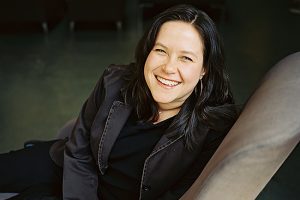 Susannah was recognized as a "visionary independent producer" when she was awarded the Mark Silverman Fellowship by the Sundance Institute in 2003. Her recent credits include: Stolen (funded by the Jerome Foundation, NYSCA, the Roy W. Dean Foundation and the Women in Film Finishing Fund; Audience Award, Sarasota Film Festival and Best Documentary, Avignon/New York Film Festival; theatrical release & broadcast on PBS' Independent Lens, 2006); Close Up: Photographers at Work (Ovation TV, 2008); Self Portrait with Cows Going Home and Other Works: A Portrait of Sylvia Plachy (Grand Jury prize, Best Short Documentary, 2008 Seattle International Film Festival); My Mother's Garden (dir: Cynthia Lester, MSNBC, 2009); and Animas Peridas (dir: Monika Navarro, funded by ITVS). Susannah is the Executive Producer/co-creator of the documentary series, BOOMTOWN, which aired on Planet Green/Discovery Networks in January 2011.
Susannah was recognized as a "visionary independent producer" when she was awarded the Mark Silverman Fellowship by the Sundance Institute in 2003. Her recent credits include: Stolen (funded by the Jerome Foundation, NYSCA, the Roy W. Dean Foundation and the Women in Film Finishing Fund; Audience Award, Sarasota Film Festival and Best Documentary, Avignon/New York Film Festival; theatrical release & broadcast on PBS' Independent Lens, 2006); Close Up: Photographers at Work (Ovation TV, 2008); Self Portrait with Cows Going Home and Other Works: A Portrait of Sylvia Plachy (Grand Jury prize, Best Short Documentary, 2008 Seattle International Film Festival); My Mother's Garden (dir: Cynthia Lester, MSNBC, 2009); and Animas Peridas (dir: Monika Navarro, funded by ITVS). Susannah is the Executive Producer/co-creator of the documentary series, BOOMTOWN, which aired on Planet Green/Discovery Networks in January 2011.
Mark Orton
Composer
 Mark is a composer working in the media of film scoring, concert music, and radio drama. He is a multi-instrumentalist, performing on all manner of guitars, keyboards, and percussion. He is the co-founder of Tin Hat, a San Francisco Bay Area based composer/improviser collective with six critically acclaimed albums. Mark has written scores for dozens of films -- documentary, feature, and fine art -- and has composed music for modern dance, theater, experimental radio, video/art installation, the circus, and the concert hall. His film composing credits include Sweet Land, The Good Girl, Everything is Illuminated, Mine, Beyond Conviction, and Nebraska.
Mark is a composer working in the media of film scoring, concert music, and radio drama. He is a multi-instrumentalist, performing on all manner of guitars, keyboards, and percussion. He is the co-founder of Tin Hat, a San Francisco Bay Area based composer/improviser collective with six critically acclaimed albums. Mark has written scores for dozens of films -- documentary, feature, and fine art -- and has composed music for modern dance, theater, experimental radio, video/art installation, the circus, and the concert hall. His film composing credits include Sweet Land, The Good Girl, Everything is Illuminated, Mine, Beyond Conviction, and Nebraska.
